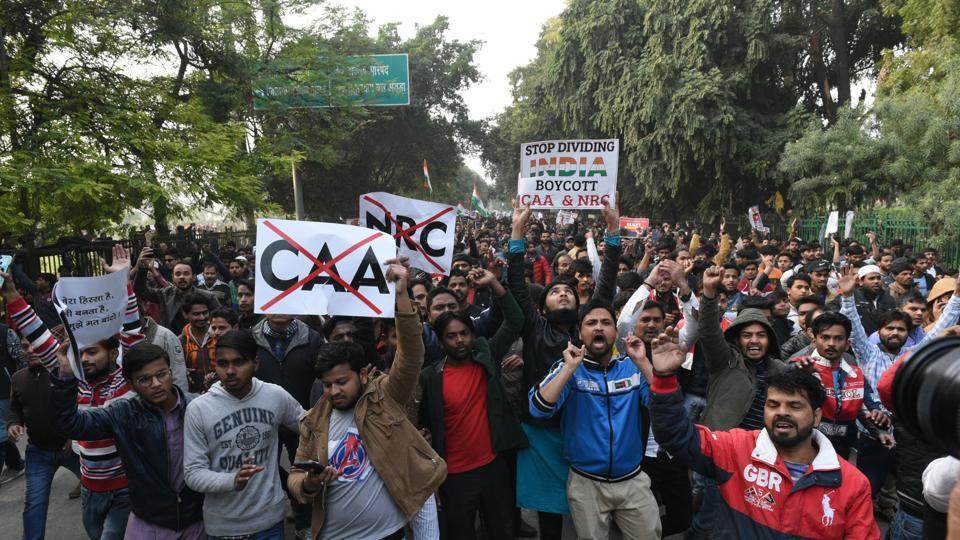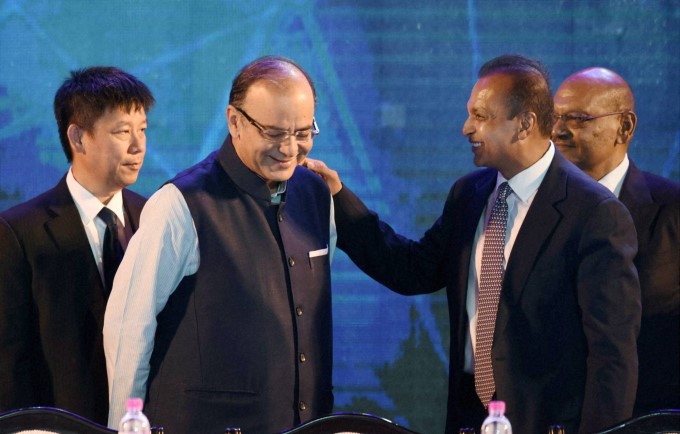In total six resolutions have been tabled as part of the European Parliament’s debate on the CAA and will be taken up for discussion on January 29. This will be followed by a vote on the matter on January 30.The six resolutions have been tabled by groups within the European Union (EU), including :
Progressive Alliance of Socialists and Democrats in the European Parliament (S&D),
Group of the European People’s Party (Christian Democrats) (PPE),
Group of the Greens/European Free Alliance (Verts/ALE), European Conservatives and Reformists Group (ECR),
Renew Europe Group (Renew) and European United Left/Nordic Green Left (GUE/NGL) Group.
Almost all groups and most of the resolutions are scathingly critical of the CAA, while some also criticise the implementation of the National Register of Citizens (NRC) in Assam and the security lockdown and detentions in Jammu and Kashmir.
The most critical is the resolution moved by the S&D Group, the second largest group with 154 MEPs, which states the CAA has the potential to “create the largest statelessness crisis in the world”.
The resolution by the EPP Group, the largest group with 182 MEPs, says the law could have negative consequences for “India’s international image and internal stability”.
The resolutions have a similar theme with a number of them, such as the GUE/NGL Group, also making a reference to the revocation of Article 370 that gave special status to Jammu and Kashmir.
They are set to be debated in the European Parliament in Brussels Wednesday and voted on the day after. If passed, it will be formally sent to the Indian government and Parliament as well as to the European Commission chiefs.
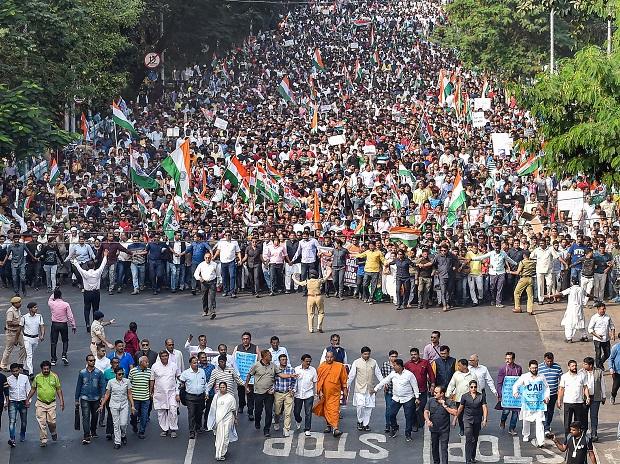
West Bengal CM Mamtha Baneerji in white Saree Leading peaceful protest against CAA
Even if the resolutions are debated and passed, they are not binding on the European Commission. However, they can increase pressure on the Indian government at a time when it is grappling with strong criticism from Western powers, including key European Union (EU) members such as Germany, of its handling of the situation in Kashmir, the citizenship law and the NRC implementation in Assam. Political Experts believe the MEPs could also lobby politicians in their home countries to raise these issues.
The matter is coming up in the European Parliament at a crucial time, as the Indian prime minister is expected to visit Brussels for the India-EU Summit on March 13. One of the groups of MEPs has suggested in its resolution that the CAA should be raised during the visit.
It Should be noted EU has already expressed concern about the situation in Kashmir and a visit to the region by envoys of EU countries is currently being discussed by the EU mission in New Delhi and the external affairs ministry.
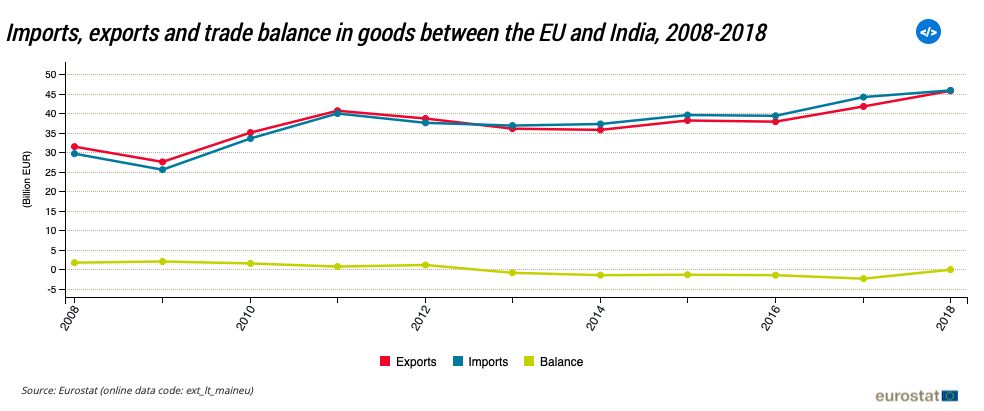
2008 – 2018 Euro Stats Source Exports Imports Trade Balance data of EU and India
Indian External affairs Ministry worry is EU is India’s 2nd largest trading partner, accounting for 92 billion euros worth of trade in goods in 2018 or 12.9% of total Indian trade, and also a key source of inward FDI, which was worth 5 billion euros in 2014. The EU is also the leading destination for Indian exports almost 18% of the total value.
Worried about the developments enumerated stoic silence with no official reaction so far from the external affairs ministry to the resolutions though unofficially it is been told that Indian officials have reiterated the CAA is an “entirely internal” matter and that the law was adopted by due process and through democratic means in Parliament.
However, the Indian MEA officials it is learnt through sources also called on the sponsors and supporters of the resolutions to engage with the Indian government to get a “full and accurate assessment of the facts before they proceed further”.
The reaction of Indian Lok Sabha Speaker Om Birla on Monday however echoed the mood of the Ruling BJP party , he said it is “inappropriate for one legislature to pass judgement on another and the practice can be misused by vested interests”.
“I understand that Joint Motion for Resolution has been introduced in the European Parliament on the Indian Citizenship (Amendment) Act, 2019. This act provides for easier citizenship to those who have been subjected to religious persecution in our immediate neighbourhood,” Upset with the developments Mr. Birla also wrote to European Parliament President David Maria Sassoli, according to PTI.
The Indian government says that the CAA aims to fastrack Indian citizenship for persecuted minorities like Hindus, Sikhs, Christians, Buddhists, Jains and Parsis seeking asylum in India from three countries Afghanistan, Bangladesh and Pakistan.
This has prompted critics to say that the act is anti-Muslims. Moves by the government to identify illegal migrants in the northeastern state of Assam have resulted in 1.9 million people being left out of citizenship rolls, stoking fears that the government could roll out this exercise nationwide and deny citizenship to some sections of people.
This has caused protests in many parts of the country against the CAA and the proposed National Registry of Citizens. Some protests have been going on since December causing a setback for Modi led BJP Government
Irrespective of back ground lobbying by Indian government officials the debate on 29th Jan 2020 EU resolutions against the CAA it is learned is to make a reference to the Charter of the United Nations, Article 15 of the Universal Declaration of Human Rights (UDHR) as well as the India-EU Strategic Partnership Joint Action Plan signed in November 2005, and to the EU-India Thematic Dialogue on Human Rights as it urges the Indian authorities to “engage constructively” with those protesting against the Act and consider their demands to repeal the “discriminatory CAA”.
“The CAA marks a dangerous shift in the way citizenship will be determined in India and is set to create the largest statelessness crisis in the world and cause immense human suffering,” notes the GUE/NGL draft.
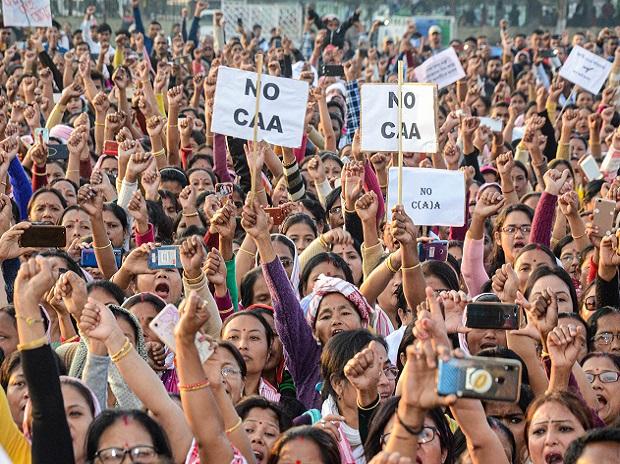
Thousand of women from Shaheen Bagh , New Delhi have been protesting Since Dec 15 2019 against the new citizenship law and the proposed pan-India National Register of Citizens. They brave bitter Delhi cold with mattresses and tarpaulin ..
“Instead of addressing the concerns, offering corrective action, calling for security forces to act with restraint and ensuring accountability, many government leaders have been engaging in efforts to discredit, rebuke and threaten the protesters,” the resolution says.
As background, the resolution sets out that since the May 2019 election, the government of India has “reinforced its nationalistic orientation” as it also makes a reference to the revocation of Article 370 from Jammu and Kashmir.
The resolution, which falls under the category of “Resolutions on topical subjects”, states that India has “created the legal grounds to strip millions of Muslims of the fundamental right of equal access to citizenship” and that the CAA could be used, along with the National Register of Citizens, to “render many Muslim citizens stateless”
These six Resolutions by the European groups if passed then bound to emanate permanent black mark on Modi led BJP Government in Indian History




